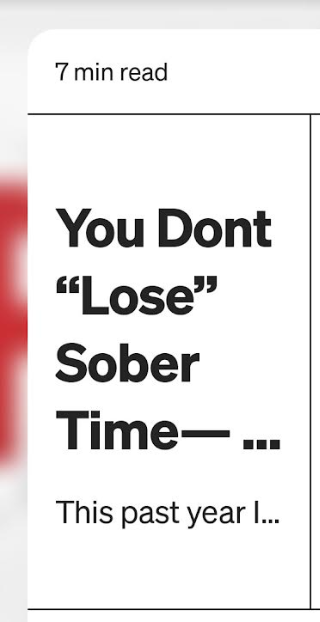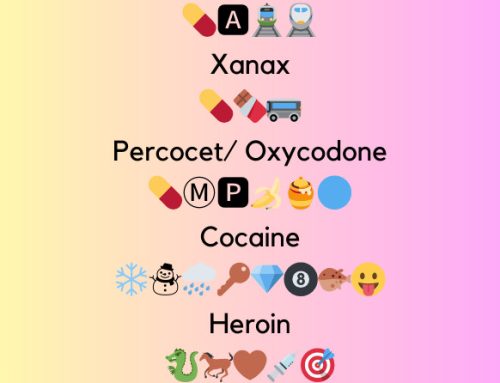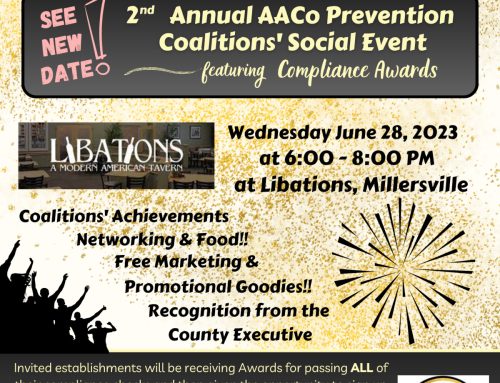
As recovery month is coming to a close, we have been allowed to share Dave Tieff’s story of recovery.
This past year I’ve connected with a multitude of alcohol-free people on Instagram, and I love it when they share how long they’ve been sober with an enthusiastic post. Life’s triumphs should be celebrated out loud, and getting sober is a sweet victory — one that deserves a good selfie. I’d much rather see that than the obligatory “photo of my drink” that is so prevalent on the interwebs.
I have only one caveat when it comes to celebrating “sober time,” especially if you relapse, and it comes from my own personal experience:
Don’t let it define how your life is going — it’s just one signpost.
Here’s a short story that illustrates my point…
During my last stint in rehab, I was paired up with a roommate, who we will call “Chuck.” I’m not protecting Chuck’s anonymity, per se, I just don’t remember his actual name.
Chuck was a burly guy in his early to mid-60s. He had a full head of long salt and pepper hair — that he brushed frequently — but the hardened looks of a blue-collar sexagenarian who is a part-time biker on weekends. The kind of guy who still lights his Marlboro by flipping a Zippo with his initials engraved on it.
I enjoyed confabbing with Chuck, and after our rehab day was done, we would shoot the breeze back and forth from our single beds just before “lights out.” This is typically when you talk about what brought you to rehab in the first place.
When that subject came up, I could see it was particularly devastating for Chuck. This is when the tough guy persona would vanish from his face and be instantly replaced with emotion. He had been sober for 27 years and ended up in rehab after one long weekend of heavy drinking.
Chuck often lamented about how he “lost 27 years” — and sometimes just to himself, mumbling under his breath, looking up at the ceiling.
He had been in Alcoholics Anonymous for 27 years, and his social network was mainly composed of other members. His AA comrades were the ones who scooped him up after his weekend bender and got him into treatment.
He was absolutely crushed that his 27 years of sobriety had evaporated, and he wasn’t sure how to go back and face the group after he got out of rehab.
You could tell that his sense of self had taken a massive blow, and from his perspective, his social standing would never be the same. I couldn’t help but feel for Chuck, but this got me thinking about the potential downside of “sober time.” Or, at least, putting all of your eggs in that precarious basket.How could one weekend of drinking negate 27 years of sobriety? It just didn’t make sense. Chuck’s devastation in ending his sobriety streak, while understandable, seemed to be logically lopsided. He didn’t commit any heinous crime that would change the rest of his life — all he did was drink. With the exception of 3 days, he had been sober for the last 9,858 days of his life. How could all of that just go away?
There’s a lot of emphasis put on continuous sober time in AA. The monthly and yearly chips given out for various lengths of sobriety are a cornerstone of the program and part of every meeting.
There’s also an unspoken but undeniable hierarchy based on a member’s sober time. Some may deny this, but I liken it to a boardroom full of rich guys. They all know who has the most money and where each of them stands in the invisible pecking order. Knowing this, it became obvious why Chuck was so devastated by having to return to the back of the line and pick up a 24-hour chip after 27 years. It was like losing his fortune.
One thing that I really like about SMART recovery, as opposed to AA, is that there are no chips or sober anniversaries. You can certainly acknowledge and even celebrate your sober time with the group, but it’s not an official component of the program. I like that it puts everyone on a level playing field when the meeting begins. I have my own “Chuck” story of why this makes more sense for me and my sobriety history.
My “sober time,” at least according to AA standards, is difficult to quantify. I first got sober in AA in my early 20s, then left the program after a year or so, but continued to go without alcohol.
A few years later, I smoked some weed and did some MDMA, which, unlike alcohol, had no life-altering consequences for me. I can’t say that it was particularly healthy or helpful to me, but so far there’s only been one drug that unraveled my life — and that’s alcohol.
Using weed would have negated a sober anniversary had I still been in the program, but because I wasn’t part of the fellowship anymore I just kept living my life. I then stopped using weed and any other mind-altering substances when I got married, and this continued for roughly 10 years.
I was sober as a judge when my marriage first started to get rocky, and that’s about the time that I picked up another drink. After a few fruitless attempts at quitting on my own, I returned to AA because it was the only place I knew to go.
No one in the group knew about my sober time unless I told them, and when I did I was told that I was a “dry drunk” because I hadn’t been attending meetings. As if my sober time (aka my life) didn’t really count because I hadn’t been working the 12 Steps.
This became particularly odd to me when my sponsor asked if I could pick up one of his other sponsees and drive him to a meeting. I obliged, and when we started talking in the car the young man informed me with pride that he just celebrated 6 months.
My sponsor must have told him that I was new to the program (even though I wasn’t really), so without knowing my full story he felt compelled to tell me how great sobriety was and what to expect in AA — since I was the “newcomer.”
I had been totally clean for 10 years and had gone almost 20 years without alcohol, and here I was listening to a guy in his early 20s — with 6 months of sobriety — like this was my first rodeo. Things just didn’t add up.
I understand the value of acknowledging and celebrating sober time, even if you aren’t in AA. It’s an important metric and a numerical way to track your progress — but it’s just one of many factors.
Using the example of the rich guys in the boardroom, who’s to say that the richest guy isn’t in poor health, under a lot of stress, or in a miserable marriage? Should we still consider him the most “successful?”
I believe that “success” in life can only be determined by YOU. Your inner circumstances carry much more weight than your outer circumstances, and many of the things that we attribute to success in our culture are ass-backward.
Chuck had 27 years of sobriety — and a life well lived in the process— that didn’t just disappear when he took a drink. That was still his life, his experience, and his history that no one could take away. It didn’t get erased like an algebra problem on a chalkboard. It was the foundation of who he had become as a human being, and not something that could be torn down with a mere 3 days of drinking.
Sure, it could all come crumbling down again, and it wouldn’t take 27 years to do it, but as far as I know he got back up on the horse and just kept riding. The last time we spoke he seemed to be enjoying life, and I’m glad that the guilt and shame of “losing 27 years” didn’t compel him to keep drinking. For many people in a similar situation, that’s exactly what happens.
The life you have already lived — the good, the bad, and the ugly — can’t be lost or taken away. Especially in sobriety. I’m not defined by my drinking years or by my sober years exclusively, but by my cumulative experience and how I choose to use it from here on out.
I try not to go searching for the bad anymore, but on the occasion that it rears its ugly head, I know that with it comes a valuable lesson that I can use for good.
Original article available at: You Dont “Lose” Sober Time— It’s Still Your Life | by Dave Tieff | Sep, 2023 | Medium




